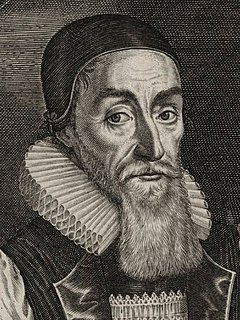Life
Estye was educated at Caius College, Cambridge, proceeding B.A. in 1580–1. He was afterwards elected a fellow of his college, graduated M.A. in 1584, and proceeded B.D. in 1591. In 1598 he was chosen preacher of St. Mary's, Bury St Edmunds.

Bury St Edmunds, commonly referred to locally as Bury, is a historic market town and civil parish in the St Edmundsbury district, in the county of Suffolk, England. Bury St Edmunds Abbey is near the town centre. Bury is the seat of the Diocese of St Edmundsbury and Ipswich of the Church of England, with the episcopal see at St Edmundsbury Cathedral.
Contents
He died at Bury on 2 August 1601, and was buried in his church, where a monument, with a Latin inscription composed by Dr. Joseph Hall, bishop of Norwich, was erected to his memory.

Joseph Hall was an English bishop, satirist and moralist. His contemporaries knew him as a devotional writer, and a high-profile controversialist of the early 1640s. In church politics, he tended in fact to a middle way.
His widow, Triphosa, became the second wife of Matthew Clarke, M.A. of Christ's College, Cambridge, twice mayor of King's Lynn, and M.P. for that borough.

King's Lynn, known until 1537 as Bishop's Lynn, is an English seaport and market town in Norfolk, about 98 miles (158 km) north of London, 36 miles (58 km) north-east of Peterborough, 44 miles (71 km) north north-east of Cambridge and 44 miles (71 km) west of Norwich. The population is 42,800. It is a cultural centre with two theatres, three museums, several other cultural and sporting venues, along with three secondary schools and one college.




